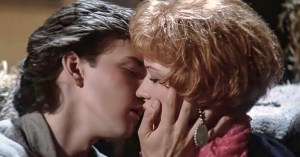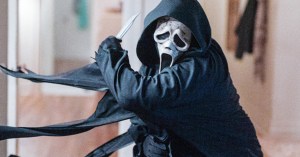Colin Farrell’s 10 Best Movies
In this week's Total Recall, we count down the best-reviewed work of the newly announced True Detective star.
Seemingly overnight at the turn of the century, Colin Farrell went from just another struggling actor to a major Hollywood star — only to retreat into semi-obscurity less than a decade later, after cluttering his filmography with a handful of big-budget turkeys. But while misguided efforts like Daredevil and Miami Vice obscured Farrell’s gifts, he remained capable of superlative work — and he’s proved it with a string of critically lauded appearances in recent films. The latest chapter in Farrell’s reinvention is set to arrive with the forthcoming season of HBO’s True Detective, in which Farrell has just been announced as one of the lead actors. With that in mind, we decided now would be the perfect time to take a look back at the critical highlights of an often underrated career. It’s time for Total Recall!
10. Phone Booth
Farrell reunited with his Tigerland director, Joel Schumacher, for this man-in-a-box action thriller about a publicist (Farrell) who finds himself trapped in a phone booth by an unseen sniper who doesn’t much care for the way he’s been living his life. Written by Larry Cohen, who had originally pitched a loose version of the concept to Alfred Hitchcock during the 1960s, Phone Booth gave Farrell the opportunity to carry most of a film’s weight on his shoulders — and he succeeded according to most critics, including Peter Howell of the Toronto Star, who wrote, “Anyone inclined to argue with the logic of the story — and there’s certainly much to argue about — is advised to just sit back and watch how Farrell’s Stu unravels before our eyes.”
9. Fright Night
If director Craig Gillespie had polled horror fans in 2011 and asked them if he really needed to remake 1985’s Fright Night, the answer probably would have been a resounding “no;” after all, the original was not only a surprise hit, it had matured into a solid favorite among scary movie lovers, and little seemed to be gained by updating the story of a horror-loving teen (William Ragsdale) who makes the awful discovery that his new neighbor (Chris Sarandon) is secretly a vampire. While it may not have been strictly necessary, the new Fright Night — starring Anton Yelchin as young Charley Brewster and Colin Farrell as the undead addition to the neighborhood — proved surprisingly potent, with Farrell’s charismatic performance matching Gillespie’s confident lens. As Adam Graham wrote for the Detroit News, “Farrell is all darting eyes, facial ticks and macho confidence. He never goes over the top, he’s not a showy actor, but he’s clearly relishing his role and eating it up with abandon. He makes this a Night to remember.”
8. Intermission
Director John Crowley made his feature film debut with this ensemble comedy about a group of young Dubliners (including Farrell, Cillian Murphy, and Colm Meaney) whose seemingly disparate struggles share a narrative thread, captured by a filmmaker (Tomas O’Suilleabhain) shadowing a police detective (Meaney) who’s determined to lock up a persistently troublesome petty crook (Farrell). While it wasn’t a big commercial hit, Intermission found favor with critics like Carrie Rickey of the Philadelphia Inquirer, who said it “bursts with the energy of a documentary filmed on the run with a stolen camera.”
7. The Way Back
A fact-based film about a group of people trudging their way out of a Soviet gulag might not sound like the most entertaining way of spending a couple of hours in a darkened theater, but there’s an exception to every rule, and according to most critics, Peter Weir’s The Way Back fits the bill. Led by Farrell, Ed Harris, Jim Sturgess, and Saoirse Ronan, this epic tribute to man’s unquenchable thirst for freedom may be pedestrian in terms of focus, but not in execution — and while it was never going to be anyone’s idea of a blockbuster hit, it found a comfortable home with critics like the Philadelphia Inquirer’s Carrie Rickey, who wrote, “Whether it is truth, fiction or, most likely, a little of each, the story Weir tells is a powerful parable of man’s charge for freedom and his humbling by nature.”
6. Tigerland
Farrell — who earned his first noteworthy credit only the year before, with a small part in Tim Roth’s The War Zone — got his big break in this Joel Schumacher war drama, which focuses on the relationships between a group of Army recruits during the waning years of the Vietnam War. By the time Tigerland reached theaters, Hollywood had been producing Vietnam movies for decades, including some true classics of American film, and the familiarity of its subject matter certainly wasn’t lost on critics; on the other hand, it was an unexpected return to form for Schumacher after garish flops like Batman & Robin and 8MM, and Farrell’s performance earned raves from writers such as Matthew Turner of ViewLondon, who wrote, “The hype is justified — Farrell’s performance just screams star quality and has already drawn comparisons with Steve McQueen and Paul Newman.”
5. Saving Mr. Banks
A holiday season Walt Disney biopic starring Tom Hanks and Emma Thompson and directed by the guy who directed The Blind Side? If you didn’t know any better, you’d suspect Saving Mr. Banks of being a movie marshmallow, but even if the results are guilty of ladling on the Disney formula, hey — it wouldn’t be a formula if it didn’t work. Part of what makes Banks such an easygoing pleasure is the expertly assembled cast that director John Lee Hancock arranged around his stars, including Paul Giamatti, Bradley Whitford, Jason Schwartzman, and — as the alcoholic father whose dark legacy shadows Mary Poppins author P.L. Travers (Thompson) even as an adult — Colin Farrell. “Saving Mr. Banks wraps a seduction inside a seduction with enjoyable results,” wrote the Wall Street Journal’s Joe Morgenstern. “It’s a Disney film in every sense of the term.”
4. In Bruges
By 2008, Farrell’s career had endured a string of high-profile duds, and plenty of people had written him off — but many of them were forced to think twice after watching In Bruges, Martin McDonagh’s pitch-black comedy about a pair of hit men (played by Farrell and Brendan Gleeson) whose latest assignment from their ill-tempered boss (Ralph Fiennes) doesn’t exactly turn out the way he intended. A Sundance favorite, Bruges earned Farrell a Golden Globe for his work, as well as critical appreciation from scribes like Roger Moore of the Orlando Sentinel, who wrote, “This dark comedy shifts effortlessly between silly and sobering, and it finally gives Colin Farrell the chance to be as funny as we’ve long suspected he could be.”
3. Seven Psychopaths
Farrell reunited with In Bruges director Martin McDonagh for 2012’s Seven Psychopaths, a similarly black, violent comedy about a struggling screenwriter named Marty (Farrell) whose efforts to complete his long-gestating script (titled, you guessed it, Seven Psychopaths), are complicated by the well-meaning but buffoonish exploits of his friends Billy (Sam Rockwell) and Hans (Christopher Walken), whose latest scheme has enraged a local gangster (Woody Harrelson) that gives Marty more to worry about than writer’s block. It’s crowded in terms of both plot and cast, but McDonagh weaves all of his threads surprisingly smoothly, and although it didn’t make much of an impact in theaters, it found plenty of friends on the critical circuit. “This,” applauded Richard Roeper, “is one of the best times I’ve had at the movies in years.”
2. Minority Report
Between 2002 and 2003, Farrell appeared in eight films, and they were a rather uneven bunch; his output during this period included such critical misfires as S.W.A.T. and Daredevil. But it wasn’t all bad, and Steven Spielberg’s Minority Report is a case in point. Starring Tom Cruise as a cop framed for a “future crime” he didn’t commit — and Farrell as the Department of Justice agent who doggedly pursues him — this visually distinctive adaptation of the Philip K. Dick short story racked up over $350 million in worldwide box office receipts, provoked political discussion during a time when civil liberties were returning to the forefront of our national news, and impressed critics such as Mick LaSalle of the San Francisco Chronicle, who applauded, “This is the kind of pure entertainment that, in its fullness and generosity, feels almost classic.”
1. Crazy Heart
Jeff Bridges earned some of the best reviews of his career for Crazy Heart — and so did Farrell, who popped up in an uncredited supporting role as Tommy Sweet, the successful former protege of Bridges’ struggling singer/songwriter character, Bad Blake. It wasn’t a big part, but it gave Farrell the chance to strip away some of the baggage that had accumulated around his talent, not to mention allowing him the chance to show off vocal chops no one knew he had. It all added up to an Oscar for Bridges, as well as some of the year’s freshest reviews; as Kyle Smith wrote for the New York Post, “It’s one of the year’s best, most deeply felt films.”
In case you were wondering, here are Farrell’s top 10 movies according RT users’ scores:
1. In Bruges — 86%
2. Saving Mr. Banks — 85%
3. Minority Report — 80%
4. Crazy Heart — 76%
5. Intermission — 76%
6. The Way Back — 72%
7. Seven Psychopaths — 71%
8. Tigerland — 71%
9. Horrible Bosses — 70%
10. American Outlaws — 69%
Take a look through Farrell’s complete filmography, as well as the rest of our Total Recall archives. And don’t forget to check out the reviews for The Way Back.





